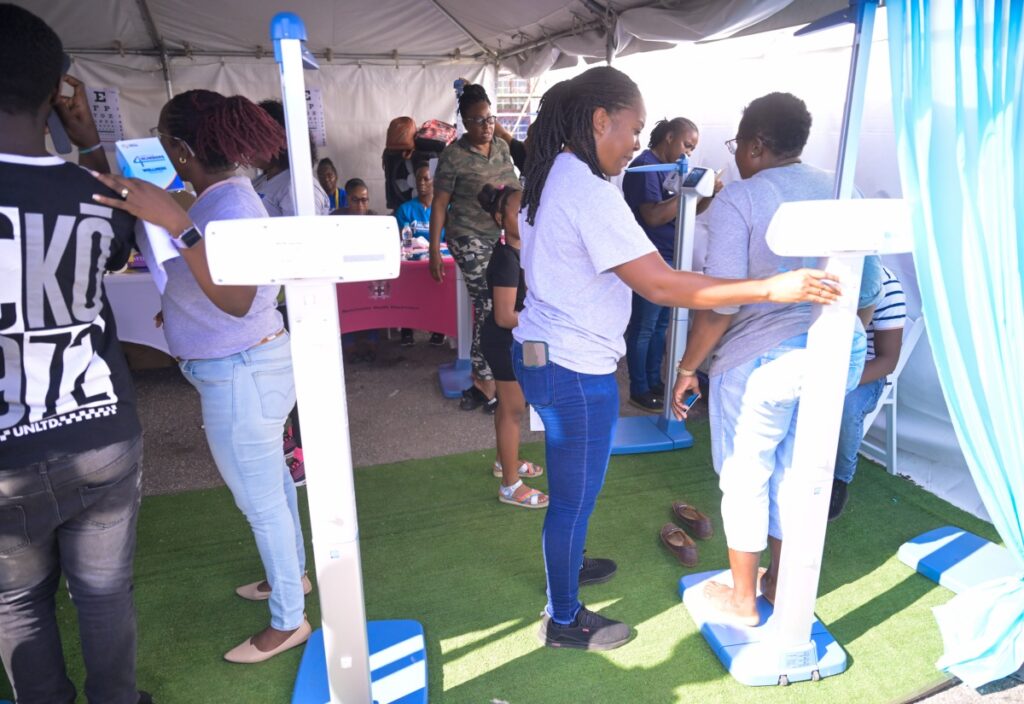

Minister of Health Dr Christopher Tufton spoke in Parliament on Tuesday (January 28) about the importance of non-communicable disease screening initiatives and Jamaicans knowing their numbers such as blood pressure, blood sugar cholesterol weight etc.
It’s important to have a healthy diet and exercise.
Below is Tufton’s address in full:

I am providing an update on the implementation of the ministry’s ‘Know Your Numbers’ initiative, which was launched in May 2023.
Madam Speaker, I remind this honourable house that non-communicable diseases (NCDs), including cardiovascular disease, diabetes, and cancer, are the leading causes of death in Jamaica.
Madam Speaker, premature death rates have increased from 17 per cent in 2009 to 21 per cent in 2020. Over this period, cardiovascular diseases and cancers contributed the highest share of potential years of life lost. Despite the high prevalence of NCDs and risk factors, health-seeking behaviours remain low, and many Jamaicans are unaware of their health status.
Madam Speaker, I wish to highlight that in 2017, only 59 per cent of hypertensive and 58 per cent of diabetic individuals aged 15 and older were aware of their condition, leaving approximately 301,000 and 129,000 persons, respectively unaware of their diagnosis.
Madam Speaker, the World Health Organization (WHO) recommends early detection, screening and treatment as well as palliative care as key components of the NCD response. In line with these recommendations, the Ministry of Health and Wellness launched the ‘Know Your Numbers (KYN)’ healthy lifestyle initiative in May 2023. This initiative emphasises awareness of key health metrics, including cholesterol, blood pressure, blood sugar, weight and body mass index (BMI).
Madam Speaker, it may be recalled that I announced this initiative in Parliament on May 3, 2023. The KYN initiative aims to conduct 500,000 screenings to help citizens identify their risk of chronic diseases, to refer those with adverse results for further test and treatment.
Additionally, through the Know Your Numbers initiative, Jamaicans are to undergo screening on an annual basis to know their health status. Outreach efforts target the most vulnerable through mobile and community-based screenings.

Madam Speaker, the objectives of the Know Your Numbers Initiative are :
- To promote screening for diseases and their risk factors across the life course (pregnancy, infancy, childhood and adolescence, adulthood, older people)
- To provide client-centred screening services to target populations
- To facilitate appropriate and timely referral and linkage of clients to further diagnostics and care services.
Know Your Numbers implementation status
Madam Speaker, I will now provide a progress update in the implementation of the Know Your Numbers Initiative.
Progress toward national screening target
As of November 2024, the KYN initiative has conducted 220,639 screenings representing 44.1 per cent of the 500,000 target. Performance has varied across the Regional Health Authorities. The Northeast Regional Health Authority has achieved 83 per cent of its target, while Southeast Regional Health Authority recorded the lowest performance at 20.8 per cent.
Madam Speaker, as it relates to number of screening tests conducted per test type, the results as at November 2024 are as follows:
- Blood glucose – 65,331 tests conducted representing 65.3 per cent of the target
- Blood pressure – 78,854 tests conducted representing 39.4 per cent of the target
- Body Mass Index – 51,359 tests conducted representing 29.3 per cent of the target
- Blood cholesterol – 29,095 tests conducted representing 100 per cent of the target.

Assessment and results by sex
Madam Speaker of the total 220,639 screenings which have been conducted, for those identified, 66.3 per cent were females, while 33.7 per cent were males, representing a 2:1 female-to-male participation ratio.
This ratio is consistent with the overall male/female health-seeking behaviour pattern. When broken down by NCD risk factor screened for, females represented the majority in all screening test categories, accounting for 66.5 per cent of blood pressure, 67 per cent of blood glucose, 68.2 per cent of blood cholesterol, and 64.2 per cent of BMI.
Abnormal test results
Madam Speaker, from the screening tests which have been conducted, Abnormal results were most common for blood pressure and body mass index (BMI) screenings, often associated with hypertension and obesity, which are critical public health concerns. Persons whose results fall within the abnormal screening range (moderate to very high), were referred for follow-up care appropriately.
Madam Speaker, the term ‘abnormal’ refers to screening results that fall outside the clinical standard range, either below or above the normal range for the screening test. The total number of abnormal results reflected 77,263 or 32 per cent of all tests, with blood pressure accounting for 34,920 (45.2 per cent); BMI, 29,347 (38 per cent); blood glucose, 7,175 (9.3 per cent); and blood cholesterol, 5,821 (7.5 per cent).

Madam Speaker, out of the 77,263 abnormal screening results, sex was identified for 72,105; representing 68.2 per cent females and 31.8 per cent males. Females also had the higher proportion of abnormal results across all NCD categories, accounting for 65.3 per cent of blood pressure tests, 65.9 per cent of blood glucose tests, 71.7 per cent of blood cholesterol tests, and 71.5 per cent of BMI tests.
Know Your Numbers feedback survey report
Madam Speaker, a critical measure of the effectiveness of the KYN health screening programme is the extent to which participants with abnormal results access the appropriate follow-up care, either at the health centre or their private doctor, as recommended in their referrals. To evaluate participants’ follow-up behaviours after screening, a feedback survey was conducted with a representative sample of 604 participants.
Madam Speaker, the survey covered several key areas, including but not limited to participant satisfaction, adherence to recommendations, and suggestions for improving the initiative. The results reveal among other things that 99 per cent of the respondents were “satisfied” or “very satisfied” with the KYN initiative.
Madam Speaker, notably, 63 per cent of the respondents indicated that they were aware that they had an existing condition, prior to screening. Regarding referrals for further follow-up after receiving screening results, 81 per cent of the respondents reported being referred, and 67 per cent of that amount affirming that they followed up within the recommended three-week period. As for lifestyle changes, 94 per cent of respondents intimated that they had made lifestyle changes, while also indicating that since attending the KYN event, they feel more informed on their health status.
Strategies to bolster Know Your Numbers implementation
Madam speaker, based on the MOHW’s assessment of the initiative, as well as feedback received from participants, several key strategies are being implemented to enhance the effectiveness of the programme. These strategies include:
- Strengthening of regional outreach and accessibility: The deployment of additional mobile screening units to underserved areas, particularly rural parishes, to enhance coverage and address regional disparities, and broaden the reach of screening activities.
- Expanding testing and outreach initiatives: Firstly, by increasing the number of testing sites and implementing more outreach programmes in the SERHA, as well underserved peri-urban areas to close healthcare access gaps. Secondly, developing region-specific health education campaigns targeting high-risk populations, with a focus on blood pressure, BMI, and other non-communicable disease (NCD) risk factors.
- Enhancing community-based interventions: Fostering more collaboration with local organisations, workplaces, and faith-based groups to increase participation in screening activities, and assist with promoting physical activity, healthy diets, and stress management. Encouraging male health advocates to lead screening efforts and health promotion initiatives.

- Improving referral and follow-up systems: Strengthening of referral mechanisms to ensure timely linkages to care for individuals with abnormal test results.
- Leveraging data for decision-making: Standardisation of data collection and monitoring protocols to improve tracking of screening results and linkage to care.
Madam Speaker, the implementation of these strategies is expected to increase screening participation to achieve the target, enhance adherence to follow-up care, and ultimately contributing to public health outcomes nationwide vis-à-vis NCD reduction.
Doctor Christopher Tufton is Jamaica’s Minister of Health and Wellness







Comments